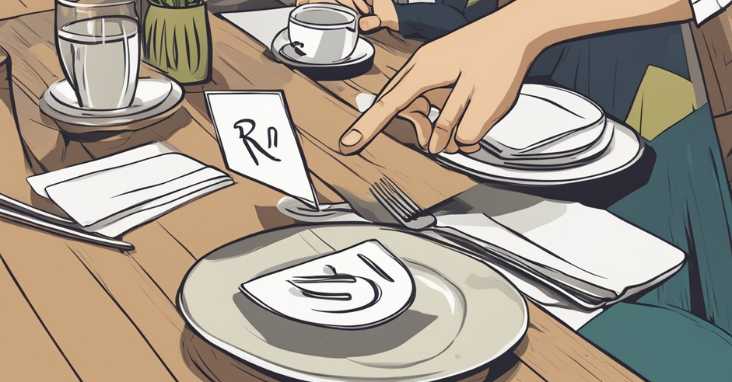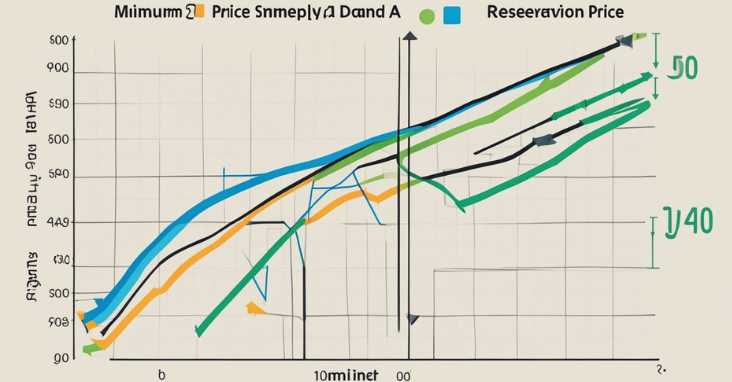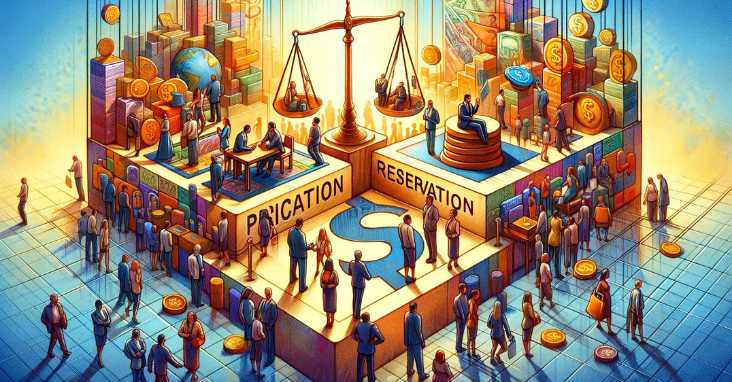What are reservation prices? Reservation prices are the minimum selling or maximum buying prices individuals set, pivotal in negotiations and market decisions.
Reservation price is a concept that is widely used in various fields, including negotiations, auctions, and real estate. It refers to the minimum amount a seller is willing to accept for a good or service, or the maximum amount a buyer is willing to pay. Understanding the price is crucial for anyone involved in negotiations, as it helps them determine their bargaining power and develop a strategy to achieve their goals.

The role of reservation price in negotiations is significant, as it sets the lowest acceptable outcome for both parties. If a reserved buyer’s price is higher than a seller’s, the buyer has the upper hand in the negotiation. Conversely, if a seller’s price is lower than a buyer’s, the seller has more bargaining power. Therefore, knowing the other party’s price can be advantageous in negotiations, as it allows one to make a more informed decision about whether to accept or reject an offer.
Overall, the reserved price is a critical factor in various economic transactions, and understanding its role can help individuals make better decisions. Whether one is negotiating a business deal, bidding in an auction, or buying a house, knowing the reserved price can provide valuable insight into the other party’s position. By developing a strong negotiation strategy and being aware of the reserved price, individuals can achieve their goals and secure the best possible outcome.
Key Takeaways
- The reserved price is the minimum amount a seller is willing to accept or the maximum amount a buyer is willing to pay for a good or service.
- Understanding the role of reserved price is crucial in negotiations, as it helps determine bargaining power and develop a strategy.
- The reserved price is a critical factor in various economic transactions, and knowing it can provide valuable insight into the other party’s position.
Understanding Reservation Price
Definition and Importance
Reservation price refers to the minimum price that a buyer is willing to pay for a product or service, or the maximum price that a seller is willing to accept. It is an important concept in economics and plays a crucial role in determining the market price of goods and services.
The reserved price is significant because it helps buyers and sellers to negotiate prices that are mutually beneficial. If a buyer’s reservation price is higher than the seller’s, then a transaction can take place. However, if the seller’s reservation price is higher than the buyer’s, then no transaction will occur.
Determining Reservation Price
The reserved price is determined by a variety of factors, including the buyer’s income, the seller’s costs, the level of demand for the product, and the range of prices offered in the market. Buyers and sellers may also consider non-monetary factors such as convenience, quality, and brand reputation when determining their reservation price.
To determine the reserved price, buyers and sellers may engage in a process of bargaining or negotiation. This process involves making offers and counteroffers until both parties agree on a price that is acceptable to both.
Reservation Price in Different Markets
The reservation price can vary depending on the type of market. In a competitive market, where there are many buyers and sellers, the reserved price is likely to be closer to the market price. In a monopolistic market, where there is only one seller, the reserved price may be higher than the market price.
In some markets, such as the stock market, the reserved price is constantly changing as new information becomes available. In other markets, such as the real estate market, the reserved price may be more stable over time.
Overall, understanding the concept of reserved price is essential for both buyers and sellers in any market. It helps to determine the fair market price of goods and services and ensures that transactions are mutually beneficial for all parties involved.
Here is a link to Investopedia’s article on Reservation Price, a high authority resource on the topic.
The Role of Reservation Price in Negotiations
In any negotiation, the reserved price is a crucial factor that determines whether or not a deal will be reached. It is the minimum price that a buyer is willing to pay or a seller is willing to accept for a particular product or service. Understanding the concept of reserved price is essential for successful negotiations.
Negotiation Basics
Negotiation is a process of reaching an agreement between two or more parties who have conflicting interests. The goal of negotiation is to create value and reach a mutually beneficial agreement. Negotiation skills are essential for buyers and sellers to achieve their objectives.
Reservation Price vs. BATNA
The reservation price is different from the best alternative to a negotiated agreement (BATNA). BATNA is the course of action that a party will take if a negotiation fails. The reservation price is the minimum acceptable outcome for a party in a negotiation. BATNA is relevant in determining the reservation price, as it provides a walk-away point for a party.
Reservation Price and ZOPA
The zone of possible agreement (ZOPA) is the range of possible outcomes that both parties can agree on in a negotiation. The reservation price determines the lower end of the ZOPA. If the buyer’s reservation price is higher than the seller’s reservation price, there is a positive ZOPA, and a deal can be reached. If the reservation prices do not overlap, there is no ZOPA, and the negotiation will fail.
Understanding the role of reservation price in negotiations is essential for buyers and sellers to achieve their objectives. Negotiation skills and a thorough understanding of BATNA and ZOPA are crucial for successful negotiations. For more information on reservation price and negotiations, check out this resource, which provides a comprehensive guide to the topic.
Reservation Price in Auctions
Auction Fundamentals
A reservation price is the minimum price that a seller is willing to accept for an item in an auction. In auctions, the reserve price is not typically disclosed to bidders and is only known by the auctioneer and the seller. The reserve price is usually set higher than the opening bid to ensure that the seller receives a fair price for their item.
Setting a Reserve Price
Setting a reserve price can be a challenging task for sellers as it requires a balance between setting a price that is too high and not attracting any bidders, and setting a price that is too low and not receiving a fair value for the item. The reserve price should be based on the item’s value, demand, and condition, among other factors.
Bidder Strategies
Bidders in an auction must decide whether to bid on an item based on their perceived value of the item and their expectation of the reserve price. If a bidder believes that the reserve price is too high, they may choose not to bid on the item. However, if a bidder believes that the reserve price is lower than the item’s value, they may choose to bid aggressively to secure the item.
According to Investopedia, “the presence of a reserve price can discourage bidders who are hoping to snag a bargain, as they may be unwilling to bid if they don’t believe the item will sell for a low enough price.” Therefore, it is important for sellers to set a reserve price that is reasonable and reflective of the item’s value.
In conclusion, setting a reserve price in auctions is an important aspect of the auction process. It ensures that sellers receive a fair price for their item, while also allowing bidders to make informed decisions on whether to bid on an item based on their perceived value and expectation of the reserve price.
Reservation Price in Real Estate and Automobiles

When it comes to negotiations in real estate and automobile purchases, understanding reservation price is crucial. Reservation price refers to the highest price that a buyer is willing to pay for a particular property or vehicle. It is the point at which the buyer is indifferent between buying and not buying.
Real Estate Pricing Strategies
In the housing market, reservation price plays a significant role in determining property value. Real estate agents often use a Comparative Market Analysis (CMA) to determine the reservation price of a house. This analysis compares the property to similar properties in the area that have recently sold. By doing so, agents can set a realistic price for the property and avoid overpricing or underpricing it.
Another pricing strategy used in real estate is the use of online valuation tools. These tools use algorithms to determine the reservation price of a house based on factors such as location, square footage, and recent sales in the area. However, it is important to note that these tools may not always provide an accurate estimate and should be used with caution.
Car Purchase Negotiations
In car purchase negotiations, reservation price is equally important. Car buyers should research the make and model of the car they want to purchase and determine its market value. This information can be obtained from websites such as Kelley Blue Book or Edmunds. By doing so, buyers can determine a reasonable reservation price and negotiate with the dealer accordingly.
When negotiating with a car dealer, buyers should be aware of various tactics that dealers use to increase the price of the vehicle. These tactics include adding unnecessary fees and charges, such as dealer preparation fees or advertising fees. Buyers should also be aware of the financing options available and negotiate the interest rate and terms of the loan.
In conclusion, reservation price is a crucial factor in real estate and automobile purchases. By understanding this concept and using appropriate pricing strategies, buyers can ensure that they are getting a fair deal.
Here is a link to Investopedia’s article on reservation price for further reading.
Economic Perspectives on Reservation Price

Reservation price is a concept that is widely used in various economic models. It refers to the maximum price that a buyer is willing to pay for a good or service, or the minimum price that a seller is willing to accept. Understanding reservation price can help businesses determine their optimal pricing strategy and maximize their profits.
Consumer Surplus and Producer Surplus
Reservation price plays a crucial role in determining both consumer surplus and producer surplus. Consumer surplus is the difference between the price that a consumer is willing to pay and the actual price that they pay. Producer surplus, on the other hand, is the difference between the actual price that a producer receives and the minimum price that they are willing to accept.
If the actual price of a good or service is lower than the reservation price of the consumer, they will experience a higher level of consumer surplus. Similarly, if the actual price is higher than the reservation price of the producer, they will experience a higher level of producer surplus. Therefore, understanding the reservation price of both consumers and producers is essential for businesses to maximize their profits.
Market Dynamics and Reservation Price
Reservation price also has a significant impact on market dynamics. In a highly competitive market, businesses need to be able to set their prices strategically to attract customers and stay ahead of their competitors. Understanding the reservation price of consumers can help businesses determine the optimal price point for their products or services.
Furthermore, reservation price can also be used as a tool for price negotiation. By understanding the reservation price of the other party, businesses can negotiate prices more effectively and maximize their profits. For example, if a seller knows the reservation price of a buyer, they can set their price just below that level to ensure that the buyer will make the purchase.
Overall, reservation price is a crucial concept in economics that can help businesses determine their optimal pricing strategy and maximize their profits. By understanding consumer and producer surplus, market dynamics, and the role of reservation price in price negotiation, businesses can make informed decisions about their pricing strategy and stay ahead of their competitors.
Here is a link to an external resource with high authority on the topic of reservation price.
Developing a Negotiation Strategy

Negotiation is an art that requires a well-planned strategy to achieve the desired outcome. Developing a negotiation strategy is a crucial step that can help individuals achieve their goals while ensuring that they do not compromise their interests. In this section, we will discuss some essential elements of developing a negotiation strategy.
Identifying Your Bottom Line
The bottom line is the minimum acceptable outcome that an individual is willing to accept in a negotiation. It is the point beyond which the individual would rather walk away from the negotiation than agree to the terms offered. Identifying your bottom line is crucial in developing a negotiation strategy as it helps you determine your limits and ensures that you do not agree to unfavorable terms. It is essential to determine your bottom line before entering into a negotiation as it can help you avoid making impulsive decisions that can lead to unfavorable outcomes.
The Importance of a Backup Plan
A backup plan is a contingency plan that an individual develops in case the negotiation does not go as planned. It is essential to have a backup plan as it helps you to be prepared for any eventuality and ensures that you do not compromise your interests.
A backup plan can also help you to walk away from a negotiation if the terms offered are not favorable. Developing a backup plan requires individuals to identify their best alternative to a negotiated agreement (BATNA). BATNA is the course of action that an individual will take if the negotiation fails to produce a desirable outcome. Identifying your BATNA can help you to develop a backup plan that ensures that you do not compromise your interests.
Maximizing Value Through Effort
Effort is a critical element of negotiation as it can help individuals maximize the value of the negotiation. Maximizing value through effort requires individuals to prepare adequately before entering into a negotiation. Preparation involves researching the other party’s interests, needs, and constraints. It also involves identifying areas of common interest and developing strategies that can help individuals achieve their goals while ensuring that they do not compromise their interests. Maximizing value through effort requires individuals to be creative and flexible in their approach to the negotiation.
In conclusion, developing a negotiation strategy is a crucial step that can help individuals achieve their goals while ensuring that they do not compromise their interests. Identifying your bottom line, developing a backup plan, and maximizing value through effort are essential elements of developing a negotiation strategy. By following these elements, individuals can negotiate with confidence and achieve favorable outcomes. For more information on negotiation strategy, individuals can refer to the Harvard Business Review’s article on “Negotiation.”
Frequently Asked Questions

How is reservation price determined in economic theory?
In economic theory, reservation price is the highest price a buyer is willing to pay for a good or service, or the lowest price a seller is willing to accept to sell a good or service. It is determined by factors such as the buyer’s or seller’s budget, preferences, and the availability of substitutes in the market.
What role does reservation price play during negotiations?
Reservation price is an important concept in negotiations as it serves as a point of reference for both parties. It helps to establish the bargaining range, which is the difference between the buyer’s maximum willingness to pay and the seller’s minimum willingness to accept. Negotiations are successful when both parties can reach an agreement within this range.
Can you describe a scenario illustrating the concept of reservation price?
A common scenario that illustrates the concept of reservation price is a car sale. The seller has a minimum price in mind that they are willing to accept for the car, known as their reservation price. The buyer, on the other hand, has a maximum price in mind that they are willing to pay for the car, known as their reservation price. If the buyer’s reservation price is higher than the seller’s reservation price, a sale can be made.
What are common methods for calculating reservation price?
There are several methods for calculating reservation price, including surveys, experiments, and market analysis. One common method is the Van Westendorp Price Sensitivity Meter, which involves asking consumers four questions to determine their perception of a product’s value and price range.
How does reservation price differ from BATNA in negotiation context?
Reservation price and Best Alternative to a Negotiated Agreement (BATNA) are both important concepts in negotiation, but they differ in their focus. Reservation price is the highest or lowest price a party is willing to accept or pay, while BATNA is the alternative course of action a party will take if negotiations fail.
What are the implications of not knowing your reservation price in a transaction?
Not knowing your reservation price in a transaction can lead to accepting a deal that is unfavorable or rejecting a deal that is beneficial. It is important to determine your reservation price before entering into negotiations to ensure you are making informed decisions.
For more information on reservation price and its role in negotiations, visit Investopedia.












